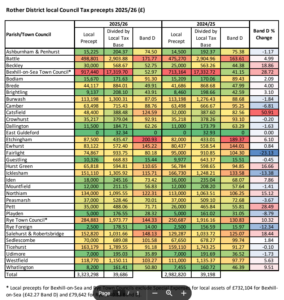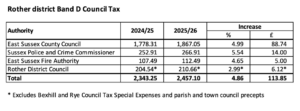On Monday, February 24, Rother District Council agreed its budget for 2025/26, which includes a 2.99 percent increase in the authority’s council tax demand. This increase will bring Rother‘s share of the annual bill for a band D household to £210.65 – an increase of £6.11 on the current financial year.
The increase is the smallest percentage rise of the charging authorities which make up the council tax. Last month, East Sussex County Council agreed to a 4.99% increase and in January, Rye Town Council voted through a 10.3% rise.
The council also plans to draw £694,000 from its reserves to balance its budget. This draw from reserves is larger than had initially been planned, as a result of the withdrawal of proposals to introduce new charges at a number of free-to-use car parks.
Introducing the budget, council leader Doug Oliver said: “It has been a very challenging time for all local authorities and I think we should be immensely pleased with ourselves that we have a balanced budget and that we are in a situation as we are, going forward into a really uncertain future for what might be out there … under reorganisation.”
He added: “I think the consultation we undertook with residents was an overwhelming success. It is important if you undertake a consultation you then react to it accordingly. It is not just there to say ‘thank you for consulting’ … it is important that we actually act on that.
“I believe officers and members acknowledge that, which I think has brought us to were we are at this moment in time.”
The withdrawal of the car parking proposals was agreed by cabinet members earlier this month, following a recommendation from the council’s overview and scrutiny committee. Northiam car park was set to be affected.
The decision was welcomed by Conservative group leader Carl Maynard, who said: “I think it has to be said … when the issue of car parking charges came up at scrutiny, there was a robust and full discussion about that and, as Cllr Oliver has referred to, a significant local concern … as to the proposed levy of car parking charges in car parks we own where there haven’t been charges before.
“Quite frankly the whole idea was absolutely bananas. There is no doubt about, many of these car parks are used by people either to drop their children off at school or to visit a local pharmacy or doctor’s surgery.
“I am really pleased that what scrutiny put forward was taken on board fully by cabinet. I think … there will be unanimity within this chamber this evening to support those changes which went through scrutiny and then through to cabinet.”
The council has previously reported a savings target of £1.176 million for 2025/26, although this figure included additional income from the withdrawn parking proposals.
When put together, the new car parking charges were expected to generate somewhere in the region of £74,000 in new income for the council. Their removal brings the council’s total savings proposals for next year down to a little over £1.1 million.

The largest part of this savings target is expected to come from national changes to planning charges, which are expected to result in around £304,251 of additional income for the council once resource costs are taken into account.
Other identified savings include plans to: cease funding to the East Sussex County Council traveller team (£21,000); recruiting in-house staff to maintain council-owned temporary accommodation (£35,000); and generating £98,880 from a project involving the sale and lease of beach huts.
These savings are offset by growth (i.e. increased costs) in other areas of council activity, which is expected to come to £540,639. As a result, the council can expect a net savings position of around £561,785 — short of the authority’s £1.4 million target.
Cllr Maynard said his group "remained" concerned about the council’s savings strategy.
He said: “Back in 2020 we were calling for a more aggressive saving strategy. Frankly that saving strategy has not delivered in the past few years.
“There have clearly been some savings but we need to have a long hard look at everything this council does to make sure there is a renewed vigour around that savings agenda as we go forwards.”
This argument saw some pushback from Cllr Oliver, who said: “In 2019 onwards we did go through Covid and there was an awful lot going on. The future and the financial position was very, very uncertain and I think it was very, very important as an administration that we actually protected services.”

Later in the meeting, councillors also agreed to a number of constitutional changes, which are intended to deliver some “modest budget savings”. These include a reduction in the number of formal committee meetings; the number of meetings held during the evening; and the number of members appointed to committees.
Councillors also agreed to change the circumstances in which a councillor could claim travel costs for attending meetings, a move intended to encourage remote attendance.
Council papers did not include exact figures on what financial benefits these changes would bring, with officers saying they would be “difficult to quantify” and “modest” in the context of the overall budget. For example, if the council were to hold five fewer evening meetings it would only save around £700 per annum.
The council’s overall savings targets bundle these changes in with other “efficiencies” in its democratic services spending, which include a reduction in printing. When combined, these measures are expected to save somewhere in the region of £4,700.
Image Credits: James Stewart , Russell Hall .



